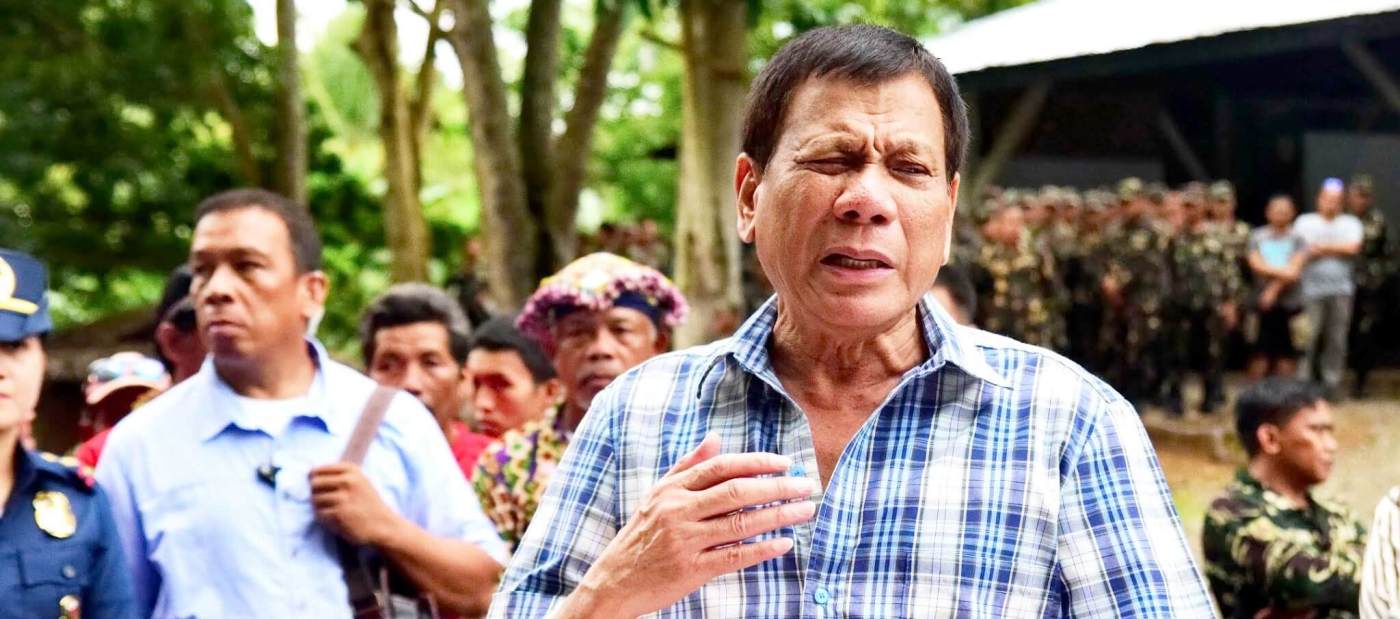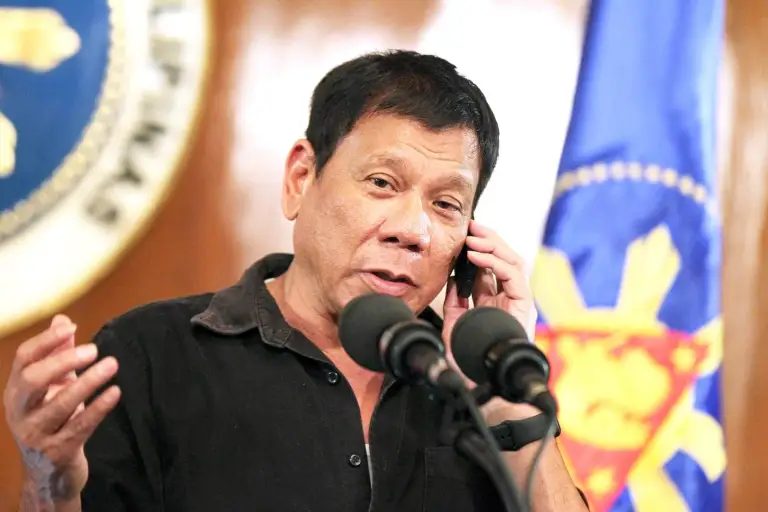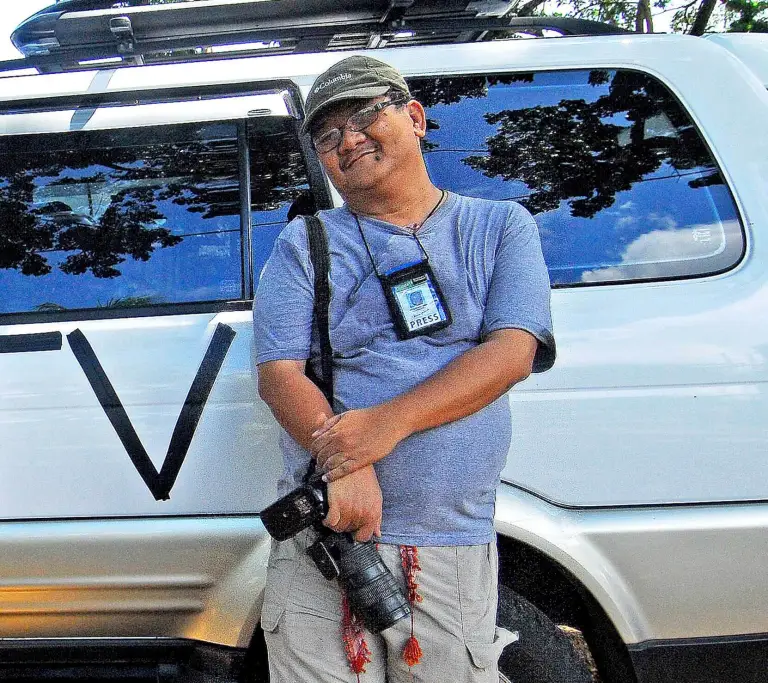How Mindanao journalists see Duterte: the other view
Covering Duterte

So much verbal abuse from the president, an Iligan-based journalist complains about his Davao City Sunday TV program (“Gikan sa Masa, Para sa Masa”). That was before he promised a “metamorphosis” once he’d be in Malacañang office. In photo, Duterte visits Camp Morgia in Doa Andrea, Asuncion, Davao del Norte, July 29, 2016. (Rene Lumawag/PPD)
How Mindanao journalists see Duterte: the other view
FROILAN O. GALLARDO
July 21, 2017 ( CJJ11 )
FROILAN GALLARDO, veteran reporter and photographer based in Cagayan de Oro City who now works with MindaNews, thinks Davao media didn’t give Rodrigo Duterte as much scrutiny as it should have and failed to defend their colleague when he was bashed publicly by the then newly elected president
CAGAYAN DE ORO— The first time local journalists here saw something was amiss was the nights after President Rodrigo Duterte won the May 2016 presidential elections by a wide margin.
As the remaining votes were tallied in Congress, Duterte already described as the “presumptive president” at this time, started holding nightly press conferences in Davao City.
Media organizations from Manila and the Visayas flocked to these midnight meetings with the press because Duterte, after all, was still a stranger to the public although during the campaign period his rape joke on a dead Australian missionary killed in a prison riot in Davao City years ago, went too far.
Temper
At first, the midnight press conferences went well until a question about Duterte’s health was asked.
The tough-talking former Davao City Mayor flared up, and it was the first time journalists saw his temper.
“Ano ba ang purpose sa pagtanong ng ganon? (What’s the purpose of a question like that?) That I cannot be a good president? Or I am a bad president because I’m suffering (from sickness)?” The Inquirer quoted Duterte.
Duterte vented his ire on Davao-based Philippine Daily Inquirer (PDI) correspondent Karlos Manlupig, whom he accused of asking the question about his health.
The President did not even tone down his temper even if another Davao-based PDI correspondent Dennis Jay Santos went public that it was he, not Manlupig, who had asked the question.
“I felt the question was legitimate considering there were already questions about his health. I wanted to clear the air,” Santos said.
Silence
Surprisingly there was hardly a whimper of protest among journalists from Davao City about Duterte’s tirade against one of their own.
“Why do you abandon your colleague at the time when he was castigated by your mayor and President?” Nelson Constantino, editor-in-chief of Businessweek Mindanao, asked in his Facebook page.
Constantino asked journalists from Davao City not to be stymied by Duterte and instead speak for the truth.
Ipakita pud unta ninyo nga wa mo mahadlok niya (You should show that you are not scared of him).
– Nelson Constantino
Constantino said the deafening silence by Manlupig’s colleagues from Davao only “reinforced the general perception that he (Duterte) is in total control in your city.”
Cursing
Other Mindanao-based journalists have also questioned Duterte’s penchant for swearing.
Iligan City-based Violeta Gloria, who covered Duterte for MindaNews in the early 2000s, said many journalists in Davao City tolerated the way Duterte talked in public and even on his Sunday TV program “Gikan sa Masa, Para sa Masa.”
Gloria said she was aghast at the language spoken by Duterte in public.
“I was surprised how casual it was for Duterte to say ‘Putang-ina (your mother is a whore).’ I suppose hindi naman mga puta ang mga nakikinig sa kanya (the ones listening to him were not whores). There was so much verbal abuse,” Gloria said.
Gloria said what was surprising was none of the many journalists wrote or reported it on radio and television.
Duterte had promised he would stop cursing once he had taken his oath as the 16th President of the Philippines.
He also limited his dealings with the media, preferring to air his press conferences—monologues actually—on the government station PTV 4 in order to complete his transformation.
Vigilant
The Cagayan de Oro Press Club (COPC) held several meetings to discuss how media would fare under the Duterte administration.

A manifesto on President Duterte’s handling of the media came from the Cagayan de Oro press but none from the Davao journalists. Here, Duterte makes a televised phone call to Vice President Leni Robredo offering her a Cabinet post, July 7, 2016. (RTVM/PPD)
Monsignor Elmer Abacahin, COPC president, said at the start, the club urged local journalists to cover the administration of Duterte as “objectively as possible.”
“It is not the job of journalists to give glowing reports. Our job is about the truth,” Abacahin said.
Former COPC president Reuben Canoy urged local journalists to give Duterte a chance to work on his campaign promises at the same time remain vigilant against any excesses.
“Power is always a temptation. The late President Ferdinand Marcos had that power, and he abused it. I hope Duterte will not follow in his steps,” Canoy said.
Like Duterte, Canoy, a former city mayor of Cagayan de Oro City and member of the Marcos-era parliament, is an advocate of federalism.
COPC members signed a manifesto urging Duterte to respect press freedom, human rights and to ensure justice for the fallen in the Ampatuan massacre.
On Nov. 23, 2009, 58 people, 32 of them media workers, were killed in Ampatuan town in Maguindanao in what is considered the worst political violence in the country’s recent history.
The manifesto signed by COPC members reads in part:
“We, the members and officers of the Cagayan de Oro Press Club Inc., will not stand idly as our colleagues in the industry continue to be targeted for doing their jobs to promote transparency and accountability in the government. “We are expressly concerned with the recent pronouncements of Duterte regarding the extrajudicial killings. The accused deserve to be given due process, while justice should be dispensed speedily.” 
Froilan O. Gallardo
Froilan O. Gallardo works for MindaNews, a cooperative of journalists running the website www.mindanews.com. Before that, he worked with Cebu Daily News as senior reporter from 1997 to 2000, and Sun. Star Cagayan de Oro as reporter, then editor-in-chief. He covers Mindanao and contributes stories and photos for international and national news media organizations. He is a recipient of many awards from the International Committee of the Red Cross and the European Union for his coverage of the conflict between the government and the Moro Islamic Liberation Front.

Froilan 0. Gallardo is a Cagayan de Oro-based reporter and photographer.

View of Davao journalists not shared by their colleagues in the country
Interview with Froilan O. Gallardo by Pachico A. Seares
You wrote about Davao journalists not protesting against the scolding of their colleague, a Davao-based correspondent for the Inquirer, by then presumptive president Duterte. “Hardly a whimper of protest,” you said.
Isn’t angry reaction, usually made verbally by the news source in the reporter’s face, common occurrence in beat coverage? Should that have been a cause for protest? We who complain about onion-skinned news sources shouldn’t be onion-skinned ourselves, media critics often tell us. Besides, wasn’t the “verbal abuse” inflicted more on the Manila reporters covering Duterte in Davao than on Davao reporters?
President Duterte is not just a source. Whatever he says becomes official policy. If he rebukes a reporter in the face, it becomes official policy of the government. Then we face the same treatment from other government agencies as well.
I suspect Duterte was not used to hard questions fielded by Manila reporters. He was “chummy” with Davao-based reporters, having spent most of his public life there. So when the questions became tough for him (even from Davao-based reporters), the outburst came naturally.
You mentioned Iligan-based reporter Violeta Gloria being “aghast” that “many journalists” in Davao have “tolerated” the way Duterte cursed in public, particularly in his TV program and “none of the many journalists” there wrote or reported it. Is that also the view of journalists in Cagayan de Oro City? Or would you say the assessments of journalists outside Davao vary?
Many journalists living outside Davao City who covered Duterte from time to time shared the view of Violeta Gloria. Had the reporters in Davao been firm in dealing with Duterte, it could be another story. I also covered him in Davao and I’ve always “wondered” about how reporters there look up to him. Sometimes I would joke they were making Duterte a god. That is not the situation in Cagayan de Oro and other Mindanao cities where there are always journalists who stand up to their mayor, councilors and congressmen.
The Cagayan de Oro Press Club decried (a) the “targeting” of industry colleagues for “doing their job to promote transparency and accountability” in government, and (b) Duterte’s pronouncements on extrajudicial killings. Couldn’t that concern be brushed aside by the fact that Davao journalists, who should be the ones primarily aggrieved, apparently don’t agree with your press club’s view?
The Cagayan de Oro Press Club cannot ignore the issue; neither can their view be discarded. When journalists from Davao chose to ignore the issue, it was time for other journalists to take up the slack. Journalists in Davao should be concerned that their view is not shared by their colleagues in the rest of the country.
A 91 percent approval rating is not a valid argument for human rights violations and other issues. Then president Benigno Aquino III also enjoyed the same rating when he started his term, then saw it fall off the grid as people became disillusioned when the reforms they expected did not come.
From your own experience in covering Duterte when he was still a local figure in Mindanao, what advice can you give for journalists to get what he means and not take his statements out of context?
President Duterte is more at home with journalists who covered his rise from city fiscal to mayor of Davao City. Manila journalists should be patient in dealing with him. They should remember he comes from a regional city that has an identity of its own. Davao, like other regional centers, doesn’t care about what Manila thinks. For most of us living in regional centers, life doesn’t revolve around Manila. And Duterte is one of those who have that in mind. In an interview with Davao-based journalists Edith Caduaya and Carolyn Arguillas, Duterte hinted that the spat between him and Manila-based reporters would be solved in time. My advice is to double-check what he tells the press against the statements of his key officials.
The president signed the executive order on Freedom of Information and formed a task force on media killings. Other presidents did the second but didn’t do the first. Do you think that compensates for the attacks and curses he had unleashed against media?
No, it does not, but it is a good starting point for investigative journalism. It could usher a new age in journalism if this thing works. 
